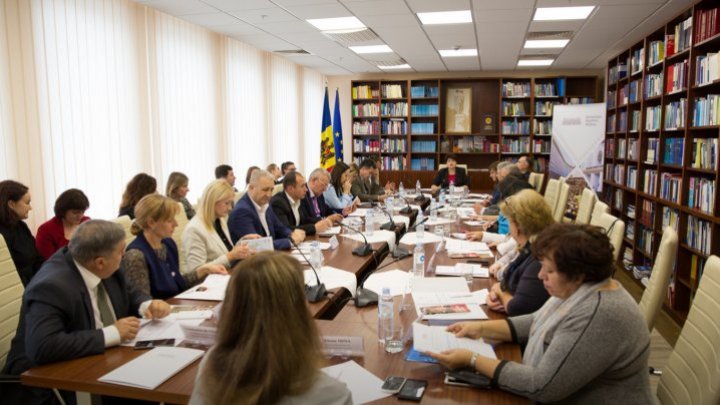Valentina Buliga: Cooperation with civil society strengthens communication process and ensures transparency of legislative process
 foto: parlament.md
foto: parlament.md
Deputies, and representatives of civil society organizations met today at the workshop "Involvement of civil society in decision-making, exchange of best practices".
The president of the Parliamentary Commission for Social Protection, Health and Family Valentina Buliga said that the openness and transparency in the activity of the legislative institution are the most important indicators of the efficiency of its functioning.
"Cooperation with civil society strengthens the communication process and ensures the transparency of the legislative process. In the context, the parliamentary committees keep records of the civil society contribution and joint activities, capitalizing on the proposals made by them", added the deputy.
At the same time, Valentina Buliga spoke about the experience of collaboration with non-governmental organizations in elaborating the Strategy for the development of civil society for the period 2018-2020 and the Action Plan for its implementation, approved by the deputies in March this year.
"I want the today's discussion to be finalized with proposals to improve the process of communication with civil society, to strengthen the participation in the elaboration and monitoring of the implementation of public policies and to share good practices," said the Parliamentarian.
Vice-President of the Judicial Commission, Appointments and Immunities, Deputy Anatolie Zagorodnii said that in recent years Parliament has advanced much in the process of opening up and transparency in the legislative process.
"We are not only forced to hear the voice of civil society, but we are even very interested in the involvement and expertise of their legislation", said the deputy.
Anatolie Zagorodni also referred to the collaboration in the process of adopting legislative acts to modify the electoral system, the concept of reforming the Prosecutor's Office, the judiciary, etc.
Deputy Corneliu Mihalache, member of the Commission for Culture, Education, Research, Youth, Sport and Mass Media, spoke about the joint activities of the Working Group on Better Media Legislation, which established a platform for communication and a permanent cooperation mechanism between the Parliament and representatives of media institutions, international institutions and media NGOs.
"It was an activity in which the voice of the civil society was not only heard, it was even decisive in the drafting of the legislation in the field", said Corneliu Mihalache.
According to the President of the National Council of Moldovan NGOs, the CEO of the CONTACT Center, Serghei Neicovcen, Parliament's website has become more accessible and easier to consult.
In turn, representatives of local NGOs were interested in how to get involved more closely in the decision-making process and mentioned their experience.
At the end of the talks, Valentina Buliga said that the proposals and suggestions submitted by the representatives of the civil society will be included in a minutes that will be submitted to the President of the Parliament so that they can be found in the public policies in the field.
The president of the Parliamentary Commission for Social Protection, Health and Family Valentina Buliga said that the openness and transparency in the activity of the legislative institution are the most important indicators of the efficiency of its functioning.
"Cooperation with civil society strengthens the communication process and ensures the transparency of the legislative process. In the context, the parliamentary committees keep records of the civil society contribution and joint activities, capitalizing on the proposals made by them", added the deputy.
At the same time, Valentina Buliga spoke about the experience of collaboration with non-governmental organizations in elaborating the Strategy for the development of civil society for the period 2018-2020 and the Action Plan for its implementation, approved by the deputies in March this year.
"I want the today's discussion to be finalized with proposals to improve the process of communication with civil society, to strengthen the participation in the elaboration and monitoring of the implementation of public policies and to share good practices," said the Parliamentarian.
Vice-President of the Judicial Commission, Appointments and Immunities, Deputy Anatolie Zagorodnii said that in recent years Parliament has advanced much in the process of opening up and transparency in the legislative process.
"We are not only forced to hear the voice of civil society, but we are even very interested in the involvement and expertise of their legislation", said the deputy.
Anatolie Zagorodni also referred to the collaboration in the process of adopting legislative acts to modify the electoral system, the concept of reforming the Prosecutor's Office, the judiciary, etc.
Deputy Corneliu Mihalache, member of the Commission for Culture, Education, Research, Youth, Sport and Mass Media, spoke about the joint activities of the Working Group on Better Media Legislation, which established a platform for communication and a permanent cooperation mechanism between the Parliament and representatives of media institutions, international institutions and media NGOs.
"It was an activity in which the voice of the civil society was not only heard, it was even decisive in the drafting of the legislation in the field", said Corneliu Mihalache.
According to the President of the National Council of Moldovan NGOs, the CEO of the CONTACT Center, Serghei Neicovcen, Parliament's website has become more accessible and easier to consult.
In turn, representatives of local NGOs were interested in how to get involved more closely in the decision-making process and mentioned their experience.
At the end of the talks, Valentina Buliga said that the proposals and suggestions submitted by the representatives of the civil society will be included in a minutes that will be submitted to the President of the Parliament so that they can be found in the public policies in the field.